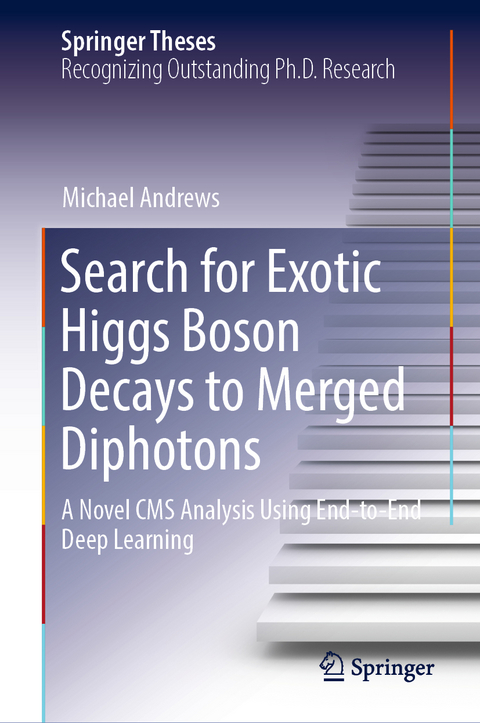
Search for Exotic Higgs Boson Decays to Merged Diphotons
Springer International Publishing (Verlag)
978-3-031-25090-3 (ISBN)
This book describes the first application at CMS of deep learning algorithms trained directly on low-level, "raw" detector data, or so-called end-to-end physics reconstruction. Growing interest in searches for exotic new physics in the CMS collaboration at the Large Hadron Collider at CERN has highlighted the need for a new generation of particle reconstruction algorithms. For many exotic physics searches, sensitivity is constrained not by the ability to extract information from particle-level data but by inefficiencies in the reconstruction of the particle-level quantities themselves. The technique achieves a breakthrough in the reconstruction of highly merged photon pairs that are completely unresolved in the CMS detector. This newfound ability is used to perform the first direct search for exotic Higgs boson decays to a pair of hypothetical light scalar particles H aa, each subsequently decaying to a pair of highly merged photons a yy, an analysis once thought impossible to perform. The book concludes with an outlook on potential new exotic searches made accessible by this new reconstruction paradigm.
Michael Andrews completed his Ph.D. in Physics at Carnegie Mellon University where he was involved with the CMS collaboration at the Large Hadron Collider at CERN. He worked at CERN in Geneva, Switzerland, from 2015 to 2019 where he served as Run Coordinator for the CMS electromagnetic calorimeter group. For his distinguished service to CMS detector operations, he received the CMS Achievement Award in 2018. Michael’s physics research focuses on the application advanced deep learning techniques to problems in LHC physics. He played a leading role in the development of deep learning algorithms trained directly on low-level detector data, so-called end-to-end physics reconstruction. His work on end-to-end physics reconstruction led to the first CMS results demonstrating the breakthrough potential of this technique over traditional methods for the reconstruction of boosted decays to highly merged photons. For his contributions, summarized in his Ph.D. thesis, he was awarded the CMS Ph.D. Thesis Award in 2021.
Introduction.- The LHC and the CMS detector.- Theory & phenomenology.- Analysis strategy.- Data sets.- Signal selection.- a mass regression.- Analysis.- Results.- Conclusions.- Supplementary studies.
| Erscheinungsdatum | 04.03.2023 |
|---|---|
| Reihe/Serie | Springer Theses |
| Zusatzinfo | XIII, 188 p. 87 illus., 77 illus. in color. |
| Verlagsort | Cham |
| Sprache | englisch |
| Maße | 155 x 235 mm |
| Gewicht | 462 g |
| Themenwelt | Informatik ► Theorie / Studium ► Künstliche Intelligenz / Robotik |
| Naturwissenschaften ► Physik / Astronomie ► Atom- / Kern- / Molekularphysik | |
| Naturwissenschaften ► Physik / Astronomie ► Hochenergiephysik / Teilchenphysik | |
| Naturwissenschaften ► Physik / Astronomie ► Quantenphysik | |
| Schlagworte | Axion-like Particles • End-to-end Deep Learning • End-to-end Physics Reconstruction • Exotic Higgs Boson Decays • Merged Photons |
| ISBN-10 | 3-031-25090-7 / 3031250907 |
| ISBN-13 | 978-3-031-25090-3 / 9783031250903 |
| Zustand | Neuware |
| Haben Sie eine Frage zum Produkt? |
aus dem Bereich


